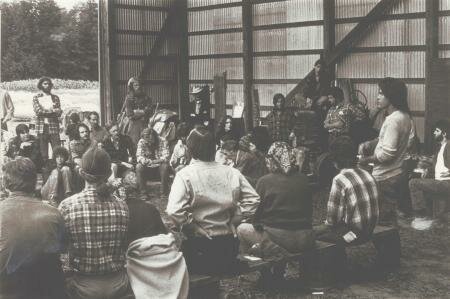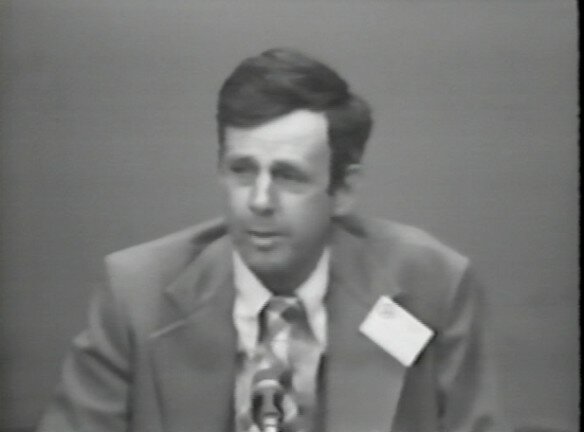In the early 1970s, organic farmers from around the state began meeting in order to establish a set of organic standards. Initially, the Rodale Research Institute, publishers of Organic Gardening magazine, helped facilitate this nationally. But it proved difficult for a publishing and research institute based in Pennsylvania to provide oversight for certification around the country. So farmers from both eastern and western Washington formed the Northwest Organic Food Producers Association, which continued to work on standards that would satisfy these pioneers of organic farming. In 1977, this group formed the Tilth Producers’ Cooperative, a non-profit alliance of growers. TPC administered the organic certification program for many years and occasional hosted conferences, but primarily they focused on cooperative production, marketing and distribution efforts.
There were a number of other cooperative ventures at that time which served to create a supportive network for farm produce. In Bellingham, Fairhaven Mills was and still is producing fine flour from organic grains. In Seattle, a cooperating community of businesses did everything from retailing produce and dry goods to providing day care and health care services. Many of these businesses no longer exist, but there is still an extensive network of natural food distributors. If some of their goals may have changed over the years, they still remain responsive to issues of sustainability and social justice.

Planning Meeting at Pragtree Farm on August 27th, 1977, at which the name “Tilth” was adopted for the organization. (Photo by Jef Jaisun)
TPC began to run out of steam in the mid-eighties, because too few growers were doing all the work of crop certification and running the organization and farming. Fortunately, however, in 1983 State Representative Ken Jacobsen from Seattle, a long-time Puget Consumer Coop board member, approached the TPC board to work with him to pass Organic Labeling legislation. After a few attempts, we were successful in 1985, when we became the second state in the country to enact a a state organic program. TPC then investigated creating an organic crop commission. It took about 18 months to survey all the organic farmers in the state. We determined that it was premature to create such a commission; there simply was not a large enough base to draw from.
With the Organic Labeling Law in place, it was relatively easy to create a certification program that could be funded by the growers, with oversight by a grower based advisory board. Initially , the active majority of TPC board members put tremendous energy and effort into developing regulations for organic production. Members were appointed to the Washington State Department of Agriculture organic advisory board. As the program evolved and gained experience along with other programs around the country, a separation between growers and certifiers developed to assure fairness.
In 1987, WSDA assumed the administration of the organic certification program. At first, the state program was small and had only a part-time staff person, Miles McEvoy. Miles recognized that farmers needed more education and technical assistance on organic methods. He initiated the publication of the Washington Tilth Journal.
Washington state now has over 1,000 certified farms and has a dedicated staff of state inspectors. Directed by Brenda Book, who took over the program when Miles departed in 2012, our state program has become a model in the United States.
Today, members of Tilth Producers continue to work with other organic agriculture activists and organizations to complete national certification standards for organic food and fiber. Washington remains a leader in this effort.
One of the founding members of TPC, Gene Kahn of Cascadian Farm, has served on the National Organic Standards Board along with former TPC board member and attorney, Margaret Clark. It was most unusual to have two people from the same state selected for a national board. They have both given a tremendous amount of volunteer time to this commitment after years of effort here in the state.
In the mid-eighties, Phil Unterschuetz, the founder of Integrated Fertility Management, Inc (IFM), began the tradition of an annual conference on organic production methods. Tilth Producers Coop became increasingly involved and has carried on with the annual event to the present.
In 1992, TPC joined the state association and became know as simply Tilth Producers, a Chapter of Washington Tilth Association. We serve a statewide membership of approximately 500 growers. The organization holds an annual conference each fall, offers and intern placement service, offers farm walks in partnership with WSU Small Farms Program, publishes a quarterly journal and an annual state-wide directory of organic and sustainable growers. markets and resources. It has recently partnerships with WSDA and Washington State University’s Cooperative Extension Service, its Center for Sustaining Agriculture and Natural Resources, its Small Farm Program and its Research Center in Puyallup to better provide information and research on biological crop production.
The Tilth Network enjoys an excellent reputation both nationally and internationally. We have an extensive resource base of people who are dedicated to creating new models of food production. We have much to be proud of. As we expand cooperation among the Tilth groups in the Northwest, it will increase our visibility and effectiveness. We have come a long way in 30 years. We still have much work to do, but we are getting better at it every year. A quote from Margaret Meade helps keep me going:
“Never doubt that a small group of thoughtful, concerned citizens can change the world: indeed it’s the only thing that ever has.”
Anne Schwartz
Article in the 1977 Tilth Newsletter
A New Beginning Mark Musick
Audio Accounts from t40, Tilth’s 2004 Anniversary conference
Seeds of a Great Idea: This History of Tilth Anne Schwartz, Lynn Coody, Yvonne Frost
Tilth As A Revolutionary Movement Woody Deryckx
Wendell Berry

The Culture of Agriculture
Letter from Wendell Berry
Woody Deryckx On the Origins of Tilth



